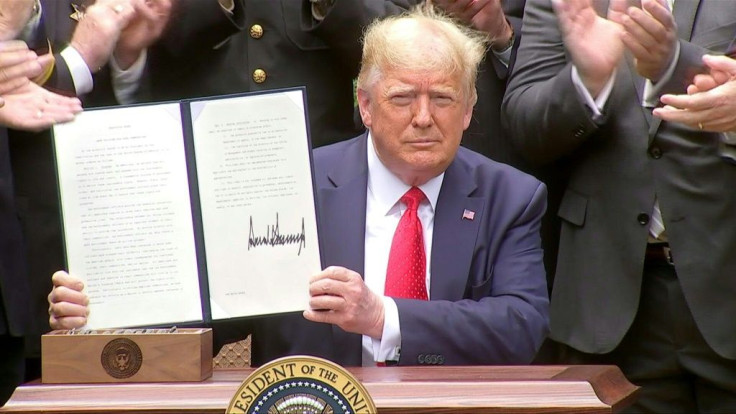Trump Signs Executive Orders Lowering Drug Prices, Says Effect Will Be 'Massive'

KEY POINTS
- President Trump says his actions will mean a "massive" reduction in drug prices, especially for seniors
- One of the orders allows for importation and reimportation of drugs that sell for much lower prices in foreign countries
- The National Association of Manufacturers already has introduced an ad campaign critical of Trump's plan
President Trump on Friday signed four executive orders he said will dramatically reduce drug costs, requiring Medicare to pay no more than other countries and allowing states and pharmacies to buy drugs from foreign countries.
“Congress has been working on this for decades and decades. We are now doing something that will be incredible for the American public,” Trump said, describing his action as “bold.”
Trump acknowledged it can cost billions of dollars and 15 years to get new drugs to market.
“We pay for all the research and all the development in foreign countries, and our people get charged more,” he said.
Trump decried restrictions that have prevented the U.S. government from negotiating drug prices. He said Americans often pay 90% more for the same drugs “from the same factories” as people in other countries.
Trump said his orders will restructure drug markets.
Trump said middlemen have been bilking Medicare, building personal fortunes by not passing on discounts as high as 50% when selling to pharmacies.
The first executive order requires community health clinics to pass on drug discounts for insulin and Epi pens to patients, the second allows importation of drugs from foreign countries, and the third cuts middleman profits.
The fourth order, dealing with favored nation pricing, will not be implemented until Aug. 24 at noon to give pharmaceutical companies time to come up with a pricing solution.
Trump said his action will lead to a “massive” reduction in drug costs while restoring the principles of free enterprise. He said the current system has meant American citizens were subsidizing drug costs in socialist countries.
Seema Verma, the administrator for the Centers for Medicare and Medicaid Services, said the restructuring will save insulin-dependent diabetics an estimated $5,000 annually.
Trump has poured billions of dollars into research for vaccines and therapeutics to tame the coronavirus pandemic, which has infected more than 4 million Americans and killed nearly 145,000. Trump praised researchers for their efforts.
The Hill reported that “the power to implement drug pricing policy through executive order is limited, meaning it will likely take time for the formal regulatory process to play out after Trump signs the orders.”
The National Association of Manufacturers already has introduced an ad campaign critical of the plan to lower drug prices.
“Want to lower drug costs? Some in Washington wrongly think price controls are the solution. Price controls dictated by other countries are a hidden tax on manufacturers that harms innovation, competitiveness and investment in new cures,” the ad states.
“Politicians shouldn’t force bad ideas from overseas on Americans that harm manufacturers’ ability to develop innovative new cures to diseases. Support access to life-saving medicines and the manufacturers who deliver them. Let’s discover the next breakthrough, not prevent it.”
Indeed, pharma companies have long contended that lower drug prices hurts future drug development and R&D activities.
In 2005, research by economists Thomas Abbott and John A. Vernon found that a price decline of 5% to 10% on a drug will reduce the company’s product development by about 5%. However, larger price cuts, say 40% to 45% would reduce the number of new drug development projects by 50% to 60%.
© Copyright IBTimes 2025. All rights reserved.






















